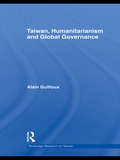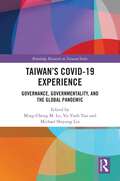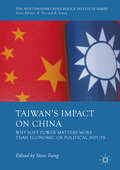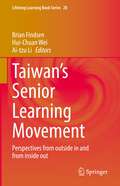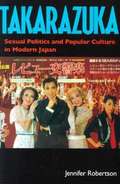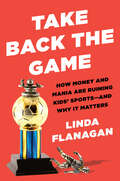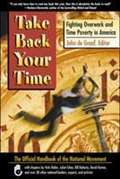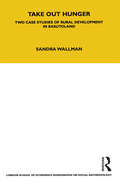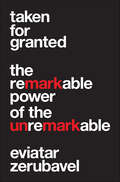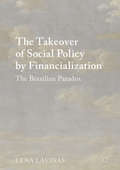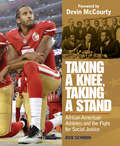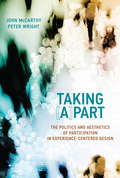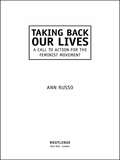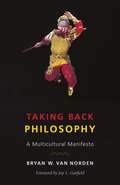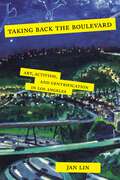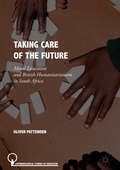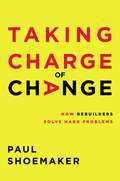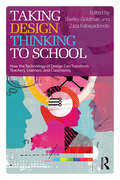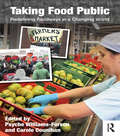- Table View
- List View
Taiwan, Humanitarianism and Global Governance (Routledge Research on Taiwan Series)
by Alain GuillouxIn this unique book, Alain Guilloux uses four major elements of governance - namely norms, actors, processes, and outcomes - to examine Taiwan’s national governance as well as its participation in global governance in relation to humanitarian aid. Including case studies on Taiwan’s application to become an observer to the WHO, and its foreign-aid policy and practice dealing with disease outbreaks and natural disasters, Guilloux explores the complexities and dilemmas of providing humanitarian aid to people in need and distress. Taking into account Taiwan's unclear status in the global arena, and how in its efforts Taiwan faces both international isolation and opposition from the People's Republic of China at multiple levels. Taiwan, Humanitarianism and Global Governance will be of interest for scholars of Chinese studies, Taiwan Studies, East Asian politics and International Relations, and environmental politics and humanitarian studies.
Taiwan’s COVID-19 Experience: Governance, Governmentality, and the Global Pandemic (Routledge Research on Taiwan Series)
by Yu-Yueh Tsai Michael Shiyung LiuThis book explores and develops the ongoing conversation about how Taiwan navigated through the COVID-19 pandemic.Emphasizing the themes of governance and governmentality, it moves the foci of the discussion from COVID policies to the social and political orders undergirding the statecraft of pandemic management. Furthermore, it analyzes how the pandemic fostered a historical moment at which new forms of governance and governmentality were beginning to take root. It also situates Taiwan’s precarious nationhood in its global context, thereby challenging a prevalent methodological nationalism – the assumption that the nation is a natural unit of analysis whose borders are more or less unquestioned – and contributing to decolonizing Western theories with perspectives from the Global South.Presenting rich original materials on the legal and public debates, individual reflections, and grassroots campaigns during COVID, this book will be essential reading for students and scholars of Taiwan's governance and social health policy, as well as medical anthropology and sociology.
Taiwan's Impact on China: Why Soft Power Matters More than Economic or Political Inputs (The Nottingham China Policy Institute Series)
by Steve TsangThis book is about the basis and scope of impact that Taiwan – a democracy with a population of around 23 million – has on China, the most powerful remaining Leninist state which claims sovereignty over Taiwan and has a population of over 1.3 billion. It examines how Taiwan has helped China in its economic transformation, but argues that the former exercises greatest influence through its soft power. The expert and timely contributions in this book demonstrate how Taiwan exerts real influence in China through admiration of its popular culture, be it in music or literature, as well as its reach into politics and economics. As mainland Chinese visit Taiwan, they are most impressed with civility in everyday living based on a modernized version of the traditional Chinese culture. However, discussions in the book also reveal the limits of Taiwan’s impact, as the Chinese government tightly controls the narrative about Taiwan and does not tolerate any Taiwanese posing a threat to its monopoly of power.
Taiwan’s Senior Learning Movement: Perspectives from outside in and from inside out (Lifelong Learning Book Series #28)
by Brian Findsen Hui-Chuan Wei Ai-Tzu LiThis volume provides an in-depth analysis of historical and recent developments of senior learning in Taiwan, where publications in English have been scant. It takes a broader view on lifelong learning and active ageing from a theoretical/conceptual base written by prominent international authors- this represents the ‘outside in’ perspective. The ‘inside out’ on the other hand signifies an in-depth investigation of initiatives written by authors from Taiwan who are closely involved with developments in policy and practice. The volume is situated theoretically in the intersection of complementary concepts such as lifelong learning, active ageing, later life learning, learning communities and social movements. It is located geographically and culturally in East Asia where senior learning/education is expanding in response to large populations of older adults and concerns about their physical and social well-being. It is argued that Taiwan is leading the way in terms of innovation and community engagement in regard to older adult learning/education and can thus serve as a model for neighboring countries. By analyzing historical precedents, cultural dynamics, policy trends, research sub-fields and community engagement this book is of interest to both East Asian and Western scholars, practitioners, policy-makers and students amongst the fields of lifelong learning, social gerontology and educational psychology.
Takarazuka: Sexual Politics and Popular Culture in Modern Japan
by Jennifer E. RobertsonFounded in 1913 as a counterpart to the all-male Kabuki theater, the all-female Takarazuka Revue is world-famous today for its rococo musical productions and fanatically devoted fans. Anthropologist Jennifer Robertson draws from over a decade of research to explore how the Revue illuminates popular culture in 20th-century Japan. 29 photos.
Take Back Our Future: An Eventful Sociology of the Hong Kong Umbrella Movement
In a comprehensive and theoretically novel analysis, Take Back Our Future unveils the causes, processes, and implications of the 2014 seventy-nine-day occupation movement in Hong Kong known as the Umbrella Movement. The essays presented here by a team of experts with deep local knowledge ask: how and why had a world financial center known for its free-wheeling capitalism transformed into a hotbed of mass defiance and civic disobedience?Take Back Our Future argues that the Umbrella Movement was a response to China's internal colonization strategies—political disenfranchisement, economic subsumption, and identity reengineering—in post-handover Hong Kong. The contributors outline how this historic and transformative movement formulated new cultural categories and narratives, fueled the formation and expansion of civil society organizations and networks both for and against the regime, and spurred the regime's turn to repression and structural closure of dissent. Although the Umbrella Movement was fraught with internal tensions, Take Back Our Future demonstrates that the movement politicized a whole generation of people who had no prior experience in politics, fashioned new subjects and identities, and awakened popular consciousness.
Take Back the Game: How Money and Mania Are Ruining Kids' Sports--and Why It Matters
by Linda FlanaganA close look at how big money and high stakes have transformed youth sports, turning once healthy, fun activities for kids into all-consuming endeavors—putting stress on children and families alikeSome 75% of American families want their kids to play sports. Athletics are training grounds for character, friendship, and connection; at their best, sports insulate kids from hardship and prepare them for adult life. But youth sports have changed so dramatically over the last 25 years that they no longer deliver the healthy outcomes everyone wants. Instead, unbeknownst to most parents, kids who play competitive organized sports are more likely to burn out or suffer from overuse injuries than to develop their characters or build healthy habits. What happened to kids' sports? And how can we make them fun again? In Take Back the Game, coach and journalist Linda Flanagan reveals how the youth sports industry capitalizes on parents&’ worry about their kids&’ futures, selling the idea that more competitive play is essential in the feeding frenzy over access to colleges and universities. Drawing on her experience as a coach and a parent, along with research and expert analysis, Flanagan delves into a national obsession that has: Compelled kids to specialize year-round in one sport. Increased the risk of both physical injury and mental health problems.Encouraged egregious behavior by coaches and parents. Reduced access to sports for low-income families. A provocative and timely entrant into a conversation thousands of parents are having on the sidelines, Take Back the Game uncovers how youth sports became a serious business, the consequences of raising the stakes for kids and parents alike--and the changes we need now.
Take Back Your Time: Fighting Overwork And Time Poverty In America
by John De GraafThe book is timed to publicize Take Back Your Time Day on October 24, 2003, this date intended to highlight that Americans typically work nine weeks longer than Western Europeans. The collection comprises 30 essays by people like Cecile Andrews, author of "Circle of Simplicity"; Kirk Warren Brown, psychology, U. of Rochester; David Korten, author of "When Corporations Rule the World"; Christine Owens of the AFL-CIO; and Camilla Fox of the Animal Protection Institute in Sacramento (Ms. Fox argues that overwork means neglect of pets). Other contributions include short essays (with even shorter editorial introductions) addressing such topics as making the right pitch to supervisors for reduced time, "overemployment" (being forced to work longer than one wants), and overwork's impact on community and the environment.
Take Control of Siri
by Scholle McFarlandWhen it comes to using your Apple devices, Siri is increasingly the hands-free, time-saving, and fun technology that ties everything together. Whether you want to ask a question, make a call, find your iPhone, or set a timer—not only can Siri do it, but it usually offers the fastest way. This book explores how to get the most out of Siri on your iPhone, iPad, Apple Watch, Mac, and HomePod.
Take Control of Siri
by Scholle McFarlandWhen it comes to using your Apple devices, Siri is increasingly the hands-free, time-saving, and fun technology that ties everything together. Whether you want to ask a question, make a call, find your iPhone, or set a timer—not only can Siri do it, but it usually offers the fastest way. This book explores how to get the most out of Siri on your iPhone, iPad, iPod touch, Apple Watch, Mac, and HomePod.
Take Control of Siri
by Scholle McFarlandWhen it comes to using your Apple devices, Siri is the hands-free, time-saving, and fun technology that ties everything together. Whether you want to ask a question, make a call, find your iPhone, or set a timer, not only can Siri do it, but it usually offers the fastest way. This book explores how to get the most out of Siri on your iPhone, iPad, Mac, Apple Watch, Apple TV, and HomePod.
Take Control of Slack
by Glenn FleishmanWrap your head around how Slack group messaging works, learn to communicate and collaborate using its many features, and discover how to use integrations and notifications to get more out of it. The book explains finding channels, starting conversations, posting messages, interacting with bots, and more! The Slack web app is covered, along with apps for macOS, Windows, iOS, and Android.
Take Out Hunger: Two Case Studies of Rural Development in Basutoland Volume 39 (London School Of Economics Monographs On Social Anthropology Ser. #No. 39)
by S. WallmanDevelopment schemes are common throughout the third world. Many fail, but the reasons for failure or success are only too often not adequately studied. In this monograph two schemes started in Basutoland - now Lesotho - are intensively analysed and compared: the first, which was abandoned in 1961, primarily by means of documentary material; the second, which was and still is successful in at least part of the area, mainly through observation and field research. The analysis reveals the factors making for success or failure, particularly in the fields of politics, economics, and communication. The relevance of the study extends beyond Lesotho and even Africa, the analysis dealing with problems common to introduced social change and development in any part of the world.
Taken for Granted: The Remarkable Power of the Unremarkable (WILDGuides)
by Eviatar ZerubavelHow the words we use—and don’t use—reinforce dominant cultural normsWhy is the term "openly gay" so widely used but "openly straight" is not? What are the unspoken assumptions behind terms like "male nurse," "working mom," and "white trash"? Offering a revealing and provocative look at the word choices we make every day without even realizing it, Taken for Granted exposes the subtly encoded ways we talk about race, gender, sexual orientation, religion, social status, and more.In this engaging and insightful book, Eviatar Zerubavel describes how the words we use--such as when we mark "the best female basketball player" but leave her male counterpart unmarked—provide telling clues about the things many of us take for granted. By marking "women's history" or "Black History Month," we are also reinforcing the apparent normality of the history of white men. When we mark something as being special or somehow noticeable, that which goes unmarked—such as maleness, whiteness, straightness, and able-bodiedness—is assumed to be ordinary by default. Zerubavel shows how this tacit normalizing of certain identities, practices, and ideas helps to maintain their cultural dominance—including the power to dictate what others take for granted.A little book about a very big idea, Taken for Granted draws our attention to what we implicitly assume to be normal—and in the process unsettles the very notion of normality.
The Takeover of Social Policy by Financialization
by Lena LavinasThis book critically addresses the model of social inclusion that prevailed in Brazil under the rule of the Workers Party from the early 2000s until 2015. It examines how the emergence of a mass consumer society proved insufficient, not only to overcome underdevelopment, but also to consolidate the comprehensive social protection system inherited from Brazil's 1988 Constitution. By juxtaposing different theoretical frameworks, this book scrutinizes how the current finance-dominated capitalism has reshaped the role of social policy, away from rights-based decommodified benefits and towards further commodification. This constitutes the Brazilian paradox: how a center-left government has promoted and boosted financialization through a market incorporation strategy using credit as a lever for expanding financial inclusion. In so doing, it has pushed the subjection of social policy further into the logic of financial markets.
Taking a Knee, Taking a Stand: African American Athletes and the Fight for Social Justice
by Bob SchronA history of the activism and achievement of African American athletes from Jesse Owens to Serena Williams to Colin Kaepernick, who advanced the cause of social justice through their outspokenness, commitment, and integrity. Muhammad Ali refused to fight in a war he believed was immoral. Wilma Rudolph retired from track and field to campaign for civil rights. Colin Kaepernick took a knee during the national anthem to draw attention to the oppression of black bodies. Taking a Knee, Taking a Stand tells their stories and the stories of other prominent African American male and female athletes who often risked their careers to fight racial discrimination and promote social justice. From Jackie Robinson breaking the color line in major league baseball to NBA great Bill Russell sitting at the feet of Dr. Martin Luther King at the 1963 March on Washington to Althea Gibson asserting her tennis dominance at a time when many clubs would not allow African Americans to play on their courts, this moving and celebratory history shows how the tradition of black protest in sports has been consistent, necessary, and organic, and that the present crisis of misunderstanding and intolerance demands that this tradition continue as the country struggles toward fairness and equity.
Taking [A]part: The Politics and Aesthetics of Participation in Experience-Centered Design (Design Thinking, Design Theory)
by Peter Wright John McCarthyA critical inquiry into the value and experience of participation in design research.In Taking [A]part, John McCarthy and Peter Wright consider a series of boundary-pushing research projects in human-computer interaction (HCI) in which the design of digital technology is used to inquire into participative experience. McCarthy and Wright view all of these projects—which range from the public and performative to the private and interpersonal—through the critical lens of participation. Taking participation, in all its variety, as the generative and critical concept allows them to examine the projects as a part of a coherent, responsive movement, allied with other emerging movements in DIY culture and participatory art. Their investigation leads them to rethink such traditional HCI categories as designer and user, maker and developer, researcher and participant, characterizing these relationships instead as mutually responsive and dialogical.McCarthy and Wright explore four genres of participation—understanding the other, building relationships, belonging in community, and participating in publics—and they examine participatory projects that exemplify each genre. These include the Humanaquarium, a participatory musical performance; the Personhood project, in which a researcher and a couple explored the experience of living with dementia; the Prayer Companion project, which developed a technology to inform the prayer life of cloistered nuns; and the development of social media to support participatory publics in settings that range from reality game show fans to on-line deliberative democracies.
Taking Action Against Homelessness (Taking Action )
by Kaye StearmanStudents learn about the causes of homelessness and what can be done to prevent it.
Taking Back Our Lives: A Call to Action for the Feminist Movement
by Ann RussoFirst published in 2001. Routledge is an imprint of Taylor & Francis, an informa company.
Taking Back Philosophy: A Multicultural Manifesto
by Bryan W. Van NordenAre American colleges and universities failing their students by refusing to teach the philosophical traditions of China, India, Africa, and other non-Western cultures? This biting and provocative critique of American higher education says yes. Even though we live in an increasingly multicultural world, most philosophy departments stubbornly insist that only Western philosophy is real philosophy and denigrate everything outside the European canon. In Taking Back Philosophy, Bryan W. Van Norden lambastes academic philosophy for its Eurocentrism, insularity, and complicity with nationalism and issues a ringing call to make our educational institutions live up to their cosmopolitan ideals. In a cheeky, agenda-setting, and controversial style, Van Norden, an expert in Chinese philosophy, proposes an inclusive, multicultural approach to philosophical inquiry. He showcases several accessible examples of how Western and Asian thinkers can be brought into productive dialogue, demonstrating that philosophy only becomes deeper as it becomes increasingly diverse and pluralistic. Taking Back Philosophy is at once a manifesto for multicultural education, an accessible introduction to Confucian and Buddhist philosophy, a critique of the ethnocentrism and anti-intellectualism characteristic of much contemporary American politics, a defense of the value of philosophy and a liberal arts education, and a call to return to the search for the good life that defined philosophy for Confucius, Socrates, and the Buddha. Building on a popular New York Times opinion piece that suggested any philosophy department that fails to teach non-Western philosophy should be renamed a “Department of European and American Philosophy,” this book will challenge any student or scholar of philosophy to reconsider what constitutes the love of wisdom.
Taking Back the Boulevard: Art, Activism, and Gentrification in Los Angeles
by Jan LinThe promises and conflicts faced by public figures, artists, and leaders of Northeast Los Angeles as they enliven and defend their neighborhoods Los Angeles is well known as a sprawling metropolis with endless freeways that can make the city feel isolating and separate its communities. Yet in the past decade, as Jan Lin argues in Taking Back the Boulevard, there has been a noticeable renewal of public life on several of the city’s iconic boulevards, including Atlantic, Crenshaw, Lankershim, Sunset, Western, and Wilshire. These arteries connect neighborhoods across the city, traverse socioeconomic divides and ethnic enclaves, and can be understood as the true locational heart of public life in the metropolis. Focusing especially on the cultural scene of Northeast Los Angeles, Lin shows how these gentrifying communities help satisfy a white middle-class consumer demand for authentic experiences of “living on the edge” and a spirit of cultural rebellion. These neighborhoods have gone through several stages, from streetcar suburbs, to disinvested neighborhoods with the construction of freeways and white flight, to immigrant enclaves, to the home of Chicano/a artists in the 1970s. Those artists were then followed by non-Chicano/a, white artists, who were later threatened with displacement by gentrifiers attracted by the neighborhoods’ culture, street life, and green amenities that earlier inhabitants had worked to create. Lin argues that gentrification is not a single transition, but a series of changes that disinvest and re-invest neighborhoods with financial and cultural capital. Drawing on community survey research, interviews with community residents and leaders, and ethnographic observation, this book argues that the revitalization in Northeast LA by arts leaders and neighborhood activists marks a departure in the political culture from the older civic engagement to more socially progressive coalition work involving preservationists, environmentalists, citizen protestors, and arts organizers. Finally, Lin explores how accelerated gentrification and mass displacement of Latino/a and working-class households in the 2010s has sparked new rounds of activism as the community grapples with new class conflicts and racial divides in the struggle to self-determine its future.
Taking Care of the Future: Moral Education And British Humanitarianism In South Africa (Anthropological Studies Of Education Ser.)
by Oliver PattendenTaking Care of the Future examines the moral dimensions and transformative capacities of education and humanitarianism through an intimate portrayal of learners, volunteers, donors, and educators at a special needs school in South Africa and a partnering UK-based charity. Drawing on his professional experience of “inclusive education” in London, Oliver Pattenden investigates how systems of schooling regularly exclude and mishandle marginalized populations, particularly exploring how “street kids” and poverty-afflicted young South Africans experience these dynamics as they attempt to fashion their futures. By unpacking the ethical terrains of fundraising, voluntourism, Christian benevolence, human rights, colonial legacies, and the post-apartheid transition, Pattenden analyzes how political, economic and social aspects of intervention materialize to transform the lives of all those involved.
Taking Charge of Change: How Rebuilders Solve Hard Problems
by Paul ShoemakerThe model to meet the unprecedented challenges unique to the decade ahead and make a remarkable impact on people&’s lives—led by the success stories of 38 change leaders whose paths of action give you the blueprint.To meet the radically different challenges of inequity, division, and scarcity of resources that will only increase over the next ten years, the most successful and valuable leaders are those with the traits to be rebuilders.Thought leader Paul Shoemaker profiles 38 rock star rebuilders so you have a model to follow, including Peter Drucker Award winner Rosanne Haggerty, whose goal is to end chronic homelessness; Trish Millines, who has changed lives for kids of color in high tech; and David Risher, whose cross-sector approach is helping solve global illiteracy.Page by page, the common elements rebuilders utilize to make a remarkable impact on some or our most complex problems are highlighted as you: Learn the 5 vital traits change leaders use to solve big problems.Gain new perspective from relevant research, data, leadership lessons, and 3 case studies that illuminate the path ahead.Meet the leaders setting the standard for social change impact, all shared in Shoemaker&’s signature storytelling style.Taking Charge of Change is written for anyone seeking to be the driver of real change and an integral part of rebuilding the structures and foundations of American communities and companies throughout the decade ahead.
Taking Design Thinking to School: How the Technology of Design Can Transform Teachers, Learners, and Classrooms
by Shelley Goldman Zaza KabayadondoDesign thinking is a method of problem-solving that relies on a complex set of skills, processes and mindsets that help people generate novel solutions to problems. Taking Design Thinking to School: How the Technology of Design Can Transform Teachers, Learners, and Classrooms uses an action-oriented approach to reframing K-12 teaching and learning, examining interventions that open up dialogue about when and where learning, growth, and empowerment can be triggered. While design thinking projects make engineering, design, and technology fluency more tangible and personal for a broad range of young learners, their embrace of ambiguity and failure as growth opportunities often clash with institutional values and structures. Through a series of in-depth case studies that honor and explore such tensions, the authors demonstrate that design thinking provides students with the agency and compassion that is necessary for doing creative and collaborative work, both in and out of the classroom. A vital resource for education researchers, practitioners, and policymakers, Taking Design Thinking to School brings together some of the most innovative work in design pedagogy.
Taking Food Public: Redefining Foodways in a Changing World
by Psyche Williams-Forson Carole CounihanThe field of food studies has been growing rapidly over the last thirty years and has exploded since the turn of the millennium. Scholars from an array of disciplines have trained fresh theoretical and methodological approaches onto new dimensions of the human relationship to food. This anthology capitalizes on this particular cultural moment to bring to the fore recent scholarship that focuses on innovative ways people are recasting food in public spaces to challenge hegemonic practices and meanings. Organized into five interrelated sections on food production – consumption, performance, Diasporas, and activism – articles aim to provide new perspectives on the changing meanings and uses of food in the twenty-first century.
